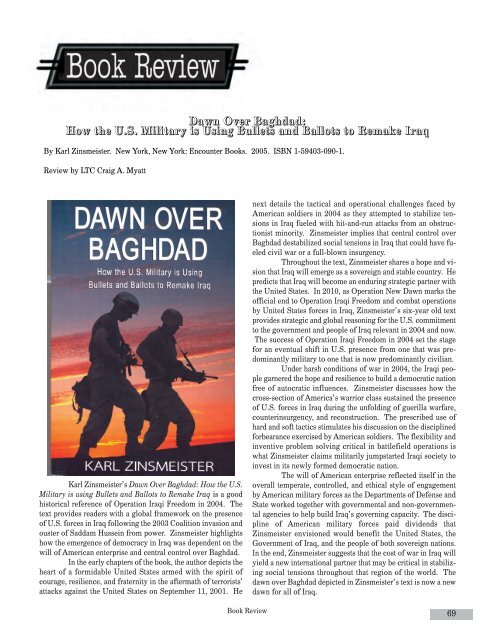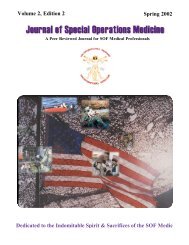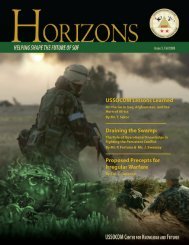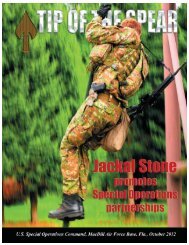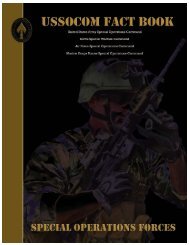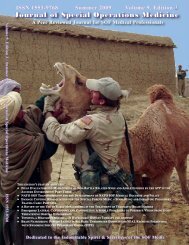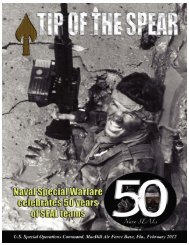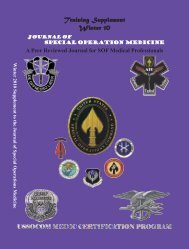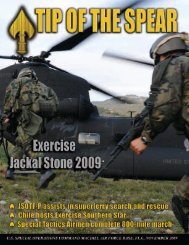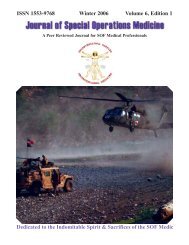Fall - United States Special Operations Command
Fall - United States Special Operations Command
Fall - United States Special Operations Command
Create successful ePaper yourself
Turn your PDF publications into a flip-book with our unique Google optimized e-Paper software.
Dawn Over Baghdad:<br />
How the U.S. Military is Using Bullets and Ballots to Remake Iraq<br />
By Karl Zinsmeister. New York, New York: Encounter Books. 2005. ISBN 1-59403-090-1.<br />
Review by LTC Craig A. Myatt<br />
Karl Zinsmeister’s Dawn Over Baghdad: How the U.S.<br />
Military is using Bullets and Ballots to Remake Iraq is a good<br />
historical reference of Operation Iraqi Freedom in 2004. The<br />
text provides readers with a global framework on the presence<br />
of U.S. forces in Iraq following the 2003 Coalition invasion and<br />
ouster of Saddam Hussein from power. Zinsmeister highlights<br />
how the emergence of democracy in Iraq was dependent on the<br />
will of American enterprise and central control over Baghdad.<br />
In the early chapters of the book, the author depicts the<br />
heart of a formidable <strong>United</strong> <strong>States</strong> armed with the spirit of<br />
courage, resilience, and fraternity in the aftermath of terrorists’<br />
attacks against the <strong>United</strong> <strong>States</strong> on September 11, 2001. He<br />
next details the tactical and operational challenges faced by<br />
American soldiers in 2004 as they attempted to stabilize tensions<br />
in Iraq fueled with hit-and-run attacks from an obstructionist<br />
minority. Zinsmeister implies that central control over<br />
Baghdad destabilized social tensions in Iraq that could have fueled<br />
civil war or a full-blown insurgency.<br />
Throughout the text, Zinsmeister shares a hope and vision<br />
that Iraq will emerge as a sovereign and stable country. He<br />
predicts that Iraq will become an enduring strategic partner with<br />
the <strong>United</strong> <strong>States</strong>. In 2010, as Operation New Dawn marks the<br />
official end to Operation Iraqi Freedom and combat operations<br />
by <strong>United</strong> <strong>States</strong> forces in Iraq, Zinsmeister’s six-year old text<br />
provides strategic and global reasoning for the U.S. commitment<br />
to the government and people of Iraq relevant in 2004 and now.<br />
The success of Operation Iraqi Freedom in 2004 set the stage<br />
for an eventual shift in U.S. presence from one that was predominantly<br />
military to one that is now predominantly civilian.<br />
Under harsh conditions of war in 2004, the Iraqi people<br />
garnered the hope and resilience to build a democratic nation<br />
free of autocratic influences. Zinsmeister discusses how the<br />
cross-section of America’s warrior class sustained the presence<br />
of U.S. forces in Iraq during the unfolding of guerilla warfare,<br />
counterinsurgency, and reconstruction. The prescribed use of<br />
hard and soft tactics stimulates his discussion on the disciplined<br />
forbearance exercised by American soldiers. The flexibility and<br />
inventive problem solving critical in battlefield operations is<br />
what Zinsmeister claims militarily jumpstarted Iraqi society to<br />
invest in its newly formed democratic nation.<br />
The will of American enterprise reflected itself in the<br />
overall temperate, controlled, and ethical style of engagement<br />
by American military forces as the Departments of Defense and<br />
State worked together with governmental and non-governmental<br />
agencies to help build Iraq’s governing capacity. The discipline<br />
of American military forces paid dividends that<br />
Zinsmeister envisioned would benefit the <strong>United</strong> <strong>States</strong>, the<br />
Government of Iraq, and the people of both sovereign nations.<br />
In the end, Zinsmeister suggests that the cost of war in Iraq will<br />
yield a new international partner that may be critical in stabilizing<br />
social tensions throughout that region of the world. The<br />
dawn over Baghdad depicted in Zinsmeister’s text is now a new<br />
dawn for all of Iraq.<br />
Book Review 69


